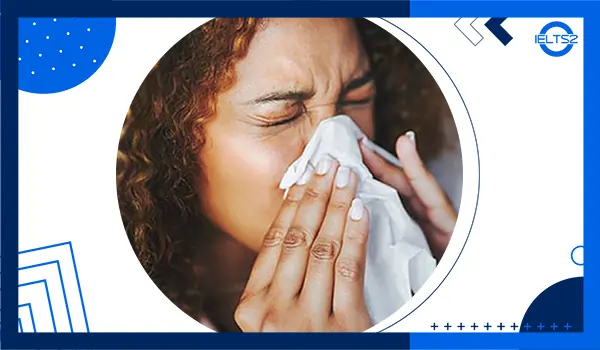نمونه سوالات اسپیکینگ آیلتس درباره بیماری ها (پارت 1 2 3)
در این بخش بیش از 20 مورد از نمونه سوالات اسپیکینگ آیلتس نمره 9 درباره “موضوع بیماری ها” را با هم میبینیم. این مجموعه از آخرین سوالات گزارش شده از سنترهای برگزار کننده آیلتس در ایران و خارج از کشور مربوط به پارت 1، 2 و 3 می باشند و شانس تکرار آن ها در آینده بالاست. در ادامه مطلب همچنین نکات گرامری، لغات و دلایل دریافت نمره 9 را به طور مشخص توضیح داده ایم تا راهنمایی برای علاقمندان باشد. 1000 نمونه سوالات اسپیکینگ آیلتس با جواب PDF پارت 1 2 3 پیشنهاد بعدی ما به شما عزیزان است.
نمونه سوالات اسپیکینگ آیلتس درباره موضوع بیماری ها (پارت 1)
1. Do you get sick easily?
I rarely get sick because I maintain a balanced lifestyle and practice good hygiene. I am cautious about my diet, exercise regularly, and ensure adequate sleep every night. I also take preventive measures during seasonal changes, such as boosting my immune system with vitamins and wearing appropriate clothing. However, occasionally I catch a mild cold. Overall, I believe that a healthy lifestyle significantly reduces the likelihood of serious illnesses, and I continuously strive to keep myself in optimal health indeed.
2. What are some common diseases in your country?
In my country, common diseases include seasonal flu, common cold, and various respiratory infections. Many people also struggle with lifestyle-related conditions such as hypertension and diabetes, largely due to sedentary habits and dietary choices. There is also a growing concern about pollution-induced ailments, which affect the respiratory system. However, widespread public health initiatives and increased awareness are gradually improving preventive measures, enabling more effective management and treatment of these illnesses overall. This situation continues to motivate efforts to enhance healthcare.
3. How do you protect yourself from illnesses?
I take numerous precautions to protect myself from illnesses. I consistently follow a balanced diet, engage in regular physical activity, and maintain rigorous personal hygiene practices. I also get vaccinated on schedule and avoid crowded places during peak flu seasons. Moreover, I ensure sufficient rest and manage stress effectively through meditation and leisure activities. This comprehensive approach helps bolster my immune system and minimizes my susceptibility to various diseases, ultimately keeping me healthy and active daily with utmost personal care.
4. Do you think modern medicine has improved disease treatment?
Absolutely, modern medicine has revolutionized disease treatment in many significant ways. Advanced diagnostic tools, effective medications, and innovative therapies have dramatically improved patient outcomes. The integration of technology into healthcare enables personalized treatments and faster recovery times. Furthermore, extensive research and clinical trials continue to drive progress in combating previously fatal diseases. Despite some challenges such as antibiotic resistance, the overall improvements in modern medical practices have made treatments more efficient, safe, and accessible to everyone globally beyond measure indeed.
5. What do you do when you catch a disease?
Whenever I catch a disease, I immediately seek appropriate medical advice and follow the prescribed treatment diligently. I ensure that I get plenty of rest, maintain proper hydration, and consume a nutritious diet to aid recovery. Additionally, I take necessary precautions to prevent spreading the illness to others by practicing good hygiene and self-isolation if needed. I also monitor my symptoms closely, and if they worsen, I promptly consult a healthcare professional to ensure a safe and speedy recovery indeed.
6. How has the media influenced public perception of diseases?
The media plays a crucial role in shaping public perception of diseases by providing extensive coverage and influencing opinions through various channels. News reports, documentaries, and social media platforms often highlight emerging health threats, which can raise awareness and sometimes cause unnecessary panic. However, the media also educates the public on preventive measures and treatment options, contributing to informed decision-making. Overall, while media coverage can sometimes exaggerate risks, it generally helps in disseminating vital health information to the broader community.
7. Have you ever experienced a severe illness?
Yes, I have experienced a severe illness in the past that taught me the value of good health and timely medical intervention. I suffered from a high fever and respiratory complications, which required hospitalization and intensive treatment. This experience was a turning point in my life, leading me to adopt a more health-conscious lifestyle. I now prioritize regular check-ups, maintain a balanced diet, and practice stress-reducing activities, all of which contribute significantly to preventing future health crises without any hesitation.
8. What measures do governments take to control diseases?
Governments implement a variety of measures to control diseases, including widespread vaccination programs, public health campaigns, and regular health screenings. They also invest in research and development to improve diagnostic methods and treatment protocols. Additionally, authorities enforce quarantine regulations and travel restrictions during outbreaks to limit disease spread. Collaborative efforts between governmental agencies and healthcare institutions ensure effective monitoring and rapid response. Such comprehensive strategies play a critical role in safeguarding public health and reducing the burden of communicable diseases.
9. How do lifestyle choices affect your risk of getting sick?
Lifestyle choices have a profound impact on my risk of getting sick. By maintaining a balanced diet, exercising regularly, and avoiding harmful habits such as smoking or excessive drinking, I significantly lower my chances of contracting diseases. Prioritizing mental well-being through stress management and adequate sleep further strengthens my immune system. These proactive decisions not only enhance overall health but also contribute to longevity. Ultimately, a conscious healthy lifestyle acts as the first line of defense against various illnesses truly.
10. Do you believe traditional remedies are effective against diseases?
I believe that traditional remedies can be effective when used appropriately, often complementing modern medical treatments. Many natural herbs and practices, passed down through generations, have shown beneficial properties in alleviating symptoms and supporting overall health. However, it is essential to rely on scientifically validated information and consult healthcare professionals before embracing remedy. I appreciate the cultural value and historical significance of these practices, and when integrated with modern medicine, they can offer a balanced, holistic approach to managing diseases.
نمونه سوالات اسپیکینگ آیلتس درباره موضوع بیماری ها (پارت 2)
Question:
Describe a personal experience related to a disease that has had a lasting impact on your perspective of health. You should say: what the experience was, how it affected you, and explain why it has been significant in your life.
Answer:
One experience that profoundly changed my outlook on health occurred when my close friend was diagnosed with a serious illness. It was an unexpected shock during our early twenties. Suddenly, the person I admired for his energy and positivity was confined to a hospital bed, battling an aggressive form of leukemia. Witnessing his struggle, I spent long hours at his side, absorbing every detail of the medical care he received. I observed how dedicated doctors and compassionate nurses worked tirelessly, instilling hope and courage in him despite the grim prognosis.
This painful period was a wake-up call that taught me the preciousness of life and the importance of preventive care. I realized that health is a delicate balance, easily disrupted by unforeseen circumstances. I began to adopt healthier habits, such as maintaining a balanced diet, exercising regularly, and prioritizing mental well-being. I also became more proactive in educating myself about early symptoms of common diseases and the significance of routine check-ups. Moreover, this experience instilled in me a sense of responsibility toward raising awareness about health issues.
I started volunteering at local clinics and organizing community workshops to share vital information on disease prevention. The ordeal demonstrated that, despite medical advancements, the human spirit is essential for recovery. It also underscored the importance of emotional support during difficult times for both patients and their families. Overall, my friend’s battle with illness transformed my personal habits and inspired me to advocate for better health practices. The memory of his courage and determination continues to motivate me every day. This experience remains a powerful reminder that, although diseases can be devastating, they also provide opportunities to learn and grow. It has reshaped my values and motivated me to work relentlessly towards a healthier, more informed society. I am forever grateful for that life-changing experience and the lessons it taught me about resilience, empathy, and the true value of health. I strive to honor his memory by living a life that promotes wellness and compassion for others. This commitment has enriched my life and empowered me to make an impact in my community.

نمونه سوالات اسپیکینگ آیلتس درباره موضوع بیماری ها (پارت 3)
1. How do diseases impact society?
Diseases have a profound impact on society by affecting not only individual health but also economic stability and social dynamics. They disrupt daily life, strain healthcare systems, and can lead to significant loss of productivity. Moreover, widespread illnesses often necessitate large-scale public health interventions and government policies, influencing social behavior and resource allocation. On a personal level, diseases foster empathy and awareness about preventive measures, encouraging communities to adopt healthier lifestyles. The collective response to health crises also highlights the importance of scientific research and innovation. Ultimately, diseases serve as a reminder of our vulnerabilities while simultaneously catalyzing societal improvements and global cooperation in addressing public health challenges. They continuously inspire advancements in medical science and strengthen community resilience remarkably.
2. What role does technology play in combating diseases?
Technology plays a crucial role in combating diseases by revolutionizing diagnostics, treatment, and prevention. Advanced imaging techniques, data analytics, and telemedicine have significantly improved early detection and management of illnesses. Moreover, wearable devices and mobile health applications enable continuous monitoring of vital signs, empowering individuals to take proactive measures in maintaining their health. Breakthroughs in biotechnology and artificial intelligence have accelerated the development of new drugs and personalized medicine. Technology also facilitates rapid information sharing among healthcare professionals worldwide, enhancing collaborative efforts to address emerging health threats. Ultimately, this innovative integration of technology into healthcare is transforming our approach to disease control and improving overall patient outcomes. These advancements are fundamentally reshaping public health strategies across global communities with excellence.
3. How do cultural beliefs influence the perception of diseases?
Cultural beliefs significantly influence the perception of diseases by shaping how individuals understand and react to illness. Many communities interpret diseases through the lens of traditional customs, attributing them to spiritual or supernatural causes rather than biological factors. These beliefs can affect treatment choices, with some preferring natural remedies over modern medicine. Cultural perspectives also influence public health communication, as messages must be tailored to resonate with local values and practices. In addition, stigma associated with certain illnesses may be perpetuated by cultural norms, complicating efforts to seek treatment and support. Understanding these cultural dimensions is essential for designing effective health interventions that respect traditions while promoting evidence-based practices. Such comprehensive understanding fosters improved global cooperation in health and unity.
4. What are the advantages and disadvantages of modern healthcare systems?
Modern healthcare systems offer numerous advantages, such as advanced technology, improved diagnostic methods, and access to cutting-edge treatments that enhance patient outcomes. They facilitate research and innovation while ensuring a structured approach to managing public health crises. However, these systems also present certain disadvantages. High costs, administrative complexities, and unequal access can hinder the efficiency and equity of healthcare delivery. Over-reliance on technology sometimes leads to reduced personal interaction between doctors and patients. Additionally, bureaucratic procedures may slow down timely decision-making. Despite these challenges, the overall benefits of modern healthcare continue to drive improvements in quality of life and longevity for communities worldwide, promoting a more resilient and progressive society. They inspire ongoing efforts to enhance service delivery consistently remarkably.
5. How can governments improve public awareness about diseases?
Governments can significantly improve public awareness about diseases through comprehensive education and communication strategies. Utilizing mass media, social platforms, and community outreach programs allows them to disseminate accurate information effectively. Public health campaigns tailored to various demographics promote understanding of symptoms, preventive measures, and treatment options. Collaborations with healthcare professionals and non-governmental organizations further enhance the credibility of the messages. Additionally, implementing school curricula that focus on health education and organizing public seminars can empower citizens to make informed decisions. Through transparent communication and consistent messaging, governments foster trust and encourage proactive health behaviors, ultimately reducing the prevalence and impact of diseases on society. Such efforts create an informed public that actively participates in maintaining community health and well-being effectively.
6. What is the role of personal responsibility in preventing diseases?
Personal responsibility plays an essential role in preventing diseases by encouraging individuals to take charge of their own health. This involves making informed lifestyle choices such as eating a balanced diet, exercising regularly, and avoiding harmful habits like smoking and excessive alcohol consumption. Additionally, adhering to recommended vaccination schedules and maintaining good hygiene practices further reduce the risk of illness. By actively seeking preventive care and health education, people can detect early symptoms and address them promptly. Personal accountability also inspires community participation in health initiatives, thereby fostering a culture of wellness. Ultimately, embracing personal responsibility is a proactive approach that not only protects individual well-being but also contributes to the overall resilience of society, ensuring a healthier future globally.
7. In what ways do economic factors affect the spread of diseases?
Economic factors significantly affect the spread of diseases by influencing healthcare accessibility and living conditions. Limited financial resources often lead to inadequate nutrition, overcrowded housing, and insufficient access to medical care, all of which can contribute to the rapid transmission of illnesses. In economically disadvantaged areas, public health infrastructure may be underfunded, making it difficult to implement effective preventive measures. Additionally, economic instability can force individuals to work in environments that expose them to health risks. On the other hand, wealthier regions benefit from advanced medical facilities and extensive public health campaigns. Overall, economic disparities create a cycle where poverty and disease reinforce each other, necessitating comprehensive policies to address these interconnected challenges. Promoting equitable development is crucial for progress.
8. How does global travel contribute to the spread of diseases?
Global travel contributes significantly to the spread of diseases by facilitating rapid movement of people across continents. As travelers interact in crowded airports, airplanes, and tourist destinations, infectious agents can quickly cross borders and reach new populations. This increased mobility often leads to the introduction of pathogens into regions where immunity is low, potentially triggering outbreaks. Moreover, the interconnected nature of international travel complicates disease tracking and containment efforts. Despite strict regulations and health checks, asymptomatic carriers can unknowingly transmit infections. In response, authorities have implemented rigorous screening and quarantine measures to mitigate risks. Ultimately, while global travel enhances cultural exchange and economic growth, it also necessitates robust international cooperation to safeguard public health effectively. Collaboration remains essential for success.
9. Do you think climate change affects the prevalence of diseases?
I believe climate change significantly affects the prevalence of diseases by altering environmental conditions that support pathogen survival and transmission. Rising temperatures, shifting rainfall patterns, and extreme weather events can expand the habitats of disease-carrying organisms such as mosquitoes and ticks. These changes increase the likelihood of outbreaks in regions previously unaffected by certain illnesses. Furthermore, climate change can disrupt ecosystems and weaken public health infrastructures, making communities more vulnerable to emerging diseases. Research continues to reveal complex connections between climate variables and health risks. Ultimately, addressing climate change is not only an environmental imperative but also a critical public health priority that requires immediate and coordinated global action. It is essential for governments and communities to collaborate urgently effectively.
10. What future challenges do you foresee in managing diseases?
Future challenges in managing diseases will likely stem from emerging pathogens, antibiotic resistance, and rapid globalization. As new viruses and bacteria evolve, healthcare systems must continually adapt to detect and treat these threats effectively. Technological advancements and innovative research play critical roles in anticipating and countering potential outbreaks. However, disparities in healthcare access, funding limitations, and inadequate infrastructure in some regions pose significant obstacles. Additionally, misinformation and public skepticism regarding vaccines and treatments can hinder effective disease control. Addressing these challenges requires international collaboration, robust surveillance systems, and sustained investment in research and education. Ultimately, the success of future disease management will depend on our ability to integrate scientific innovation with comprehensive public health strategies. Preparedness and adaptability are essential.
پاسخهایی که در سطح نمره ۹ ارزیابی شدهاند، از نظر گرامری و واژگانی دارای ویژگیهای برجستهای هستند که عبارتند از:
تنوع و پیچیدگی ساختار جملات:
در پاسخ سوالات اسپیکینگ آیلتس درباره بیماری ها از جملات مرکب و پیچیده استفاده شده است که نشان میدهد داوطلب قادر به استفاده از ساختارهای دستوری پیشرفته است. استفاده از عبارات شرطی، نسبی و همپیوست به انتقال دقیقتر معانی کمک میکند.دقت و صحت گرامری:
اشتباهات گرامری در پاسخ سوالات اسپیکینگ آیلتس درباره بیماری ها مشاهده نمیشود. افعال به درستی صرف شدهاند و ترتیب کلمات به گونهای است که روانی و صحت زبان انگلیسی را به خوبی منعکس میکند.تنوع واژگانی و اصطلاحات:
استفاده از واژگان دقیق، اصطلاحات و کلماتی که به صورت طبیعی در زبان انگلیسی به کار میروند، از ویژگیهای مهم سطح نمره ۹ است. بهعلاوه، به کارگیری مترادفها و کلمات سطح بالا، توانایی داوطلب در مدیریت منابع زبانی را نشان میدهد.هماهنگی و انسجام متنی:
پاسخهای سوالات اسپیکینگ آیلتس بیماری ها با استفاده از کلمات ربط و عبارات انتقالی به خوبی سازماندهی شدهاند. این امر موجب میشود که متن دارای انسجام منطقی و پیوستگی موضوعی باشد که از نظر ارزیابان IELTS از اهمیت ویژهای برخوردار است.عمق و دقت در محتوا:
علاوه بر جنبههای گرامری و واژگانی، پاسخها از نظر محتوا نیز جامع و دقیق هستند؛ به این صورت که جزئیات کافی برای توضیح موضوع ارائه شده و ایدهها به صورت منطقی و منسجم بیان شدهاند.
ترکیب این عوامل باعث شده است که پاسخ سوالات اسپیکینگ آیلتس درباره بیماری ها در ارزیابیهای نمرهدهی IELTS به عنوان نمونههایی در سطح نمره ۹ شناخته شوند، زیرا نشاندهنده تسلط کامل بر زبان انگلیسی از نظر ساختار و دایره لغات است.
مطالبی برای مطالعه بیشتر
لکچر انگلیسی در مورد بیماری (با ترجمه فارسی)
لغات آیلتس موضوع بیماری (Disease)
داستان کوتاه درباره بیماری (با ترجمه فارسی)
جملات انگلیسی در مورد سلامتی (با ترجمه فارسی)
رایتینگ آیلتس موضوع سلامت (تحلیل گرامری نمونه نمره ۹)
تعیین سطح رایگان اسپیکینگ ❤️
نمونه سوالات اسپیکینگ آیلتس درباره “موضوع بیماری ها” پارت 1 2 3 را به همراه سمپل های نمره 9 آن ها با هم دیدیم. در ادامه نمونه سوالات دسته بندی شده اسپیکینگ آیلتس پیشنهاد آخر ما به دوستان گرامی هست. این نمونه سوالات اسپکینگ از پرتکرار ترین تاپیک های این بخش و همچنین جدیدترین موضوعات می باشند. این مجموعه توسط یکی از سایت های معتبر و فعال آیلتس تنظیم شده است. همچنین برای تعیین سطح و تعیین رایگان نمره اسپیکینگ و دریافت جدید ترین سمپل های نمره 9 در کانال تلگرام اسپیکینگ ما همراه باشید و به ادمین برای تعیین نمره اطلاع دهی





